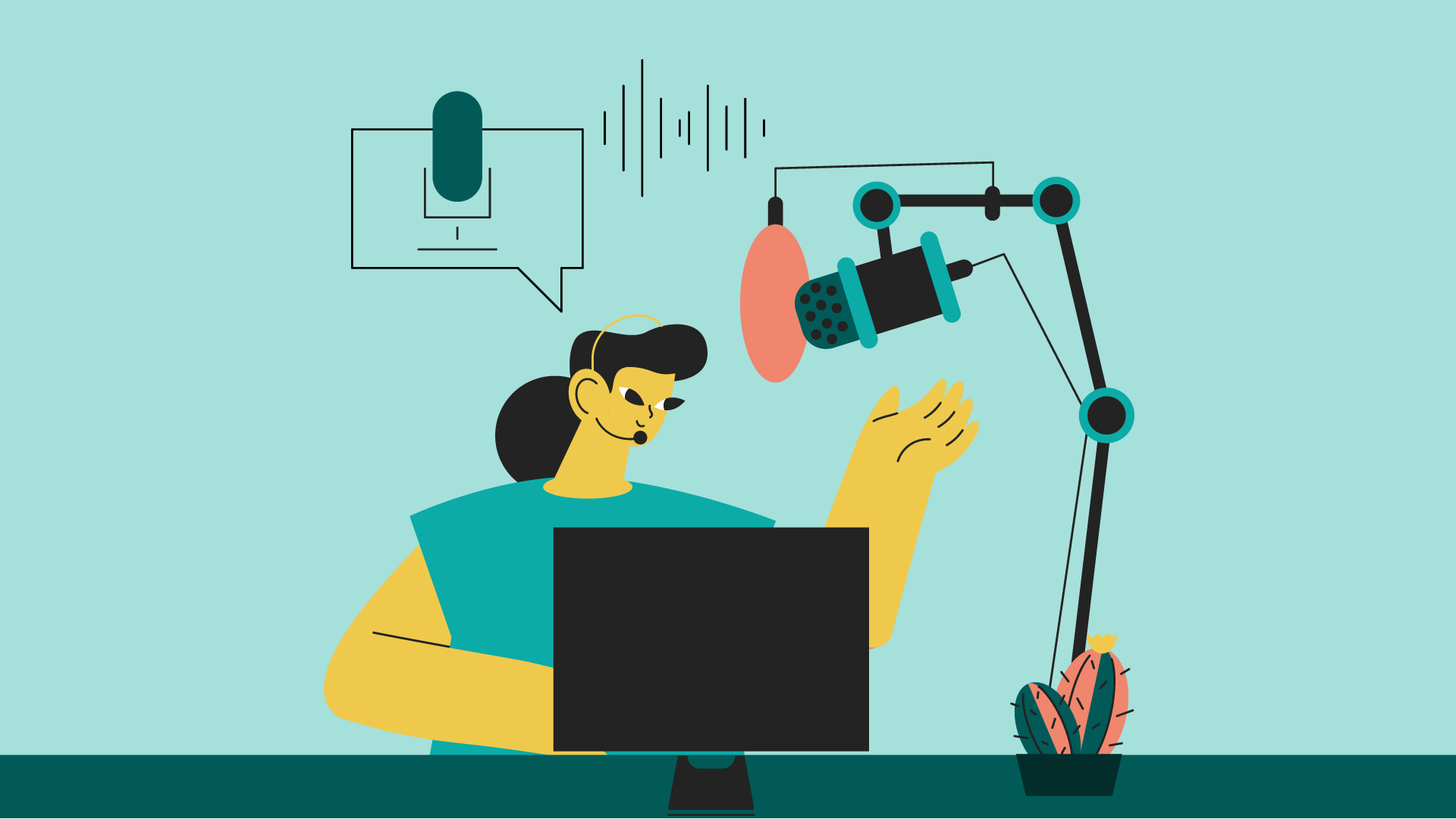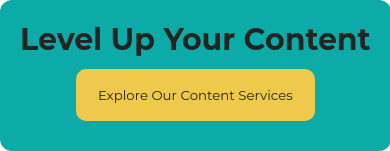There are 3.2 million podcasts out there, according to Exploding Topics. But don’t let that big number scare you away.
With a podcast, your SaaS company can create meaningful connections with top prospects, celebrate customers, and build authority in your industry. You just have to find your niche and provide your target audience with valuable conversations. Easy right? Don’t worry — it’s not as hard as you might think.
At First Page Strategy, we host our own podcast, Remotely Cultured, where we discuss growth marketing trends and remote work with marketing leaders and founders in the SaaS space. Now, we’re sharing exactly how to launch, produce, and promote a podcast that actually generates new business.
In This Article:
Find Your Niche
Reach Out To Potential Guests
Create An Automated Email Workflow For Podcast Guests
Prep For And Record The Interview
Edit And Publish Your Episodes
Promote Your Episodes
Follow Up With Your Podcast Guests
Find Your Niche
Before you hit record, you need to clearly define the focus of your podcast. Spend some time researching the existing podcasts in your space and thinking about how you can differentiate yourself. What will make your target audience want to listen? You will also need to figure out the title, format, and host as well as who your target audience will be (this will likely align with one or multiple of your personas).
Reach Out To Potential Guests
Define Your Ideal Guest
Before you start reaching out to guests, define who your ideal guest is. For SaaS companies, a podcast interview is a great opportunity to build relationships with your target audience. If you have target accounts, think about integrating guest outreach into your ABM strategy.
Offering to be a guest on a podcast is a much softer ask than straight up selling, so you’re more likely to get prospects to say yes to the podcast (especially if they’re not ready to buy). Then, you can build off that conversation, and hopefully, they become a customer down the road.
Build Your Outreach List
Time to brain dump. List all the companies you can think of who would be dream customers (these could be your target accounts if you have them). Use your lead database (i.e. Apollo.io or ZoomInfo) to find the individuals at those companies who align with your ideal guest. If you can’t find their email address, use LinkedIn to reach out.
Next, list thought leaders in your space. They might not become customers, but they will attract listeners to your podcast. And last but not least, add existing customers and champions — this is a great chance to highlight them.
Keep in mind that people who have previously been guests on podcasts, host their own podcast, and/or are engaged on social media are more likely to do your podcast.
Write A Personalized Pitch
Just like any pitch, when you reach out to potential guests, you need to:
- Show value: What can your podcast do for the guest? This might be as simple as exposure for their company or personal brand.
- Personalize the message: Tailor your outreach so the potential guest can see you’re genuinely interested in them and their work.
- Make the subject line easy to search: Even if the potential guest isn’t interested when you first reach out, they might be later on. So, ensure your subject line is clear and easy to find in a full inbox.
- Follow up: After your initial outreach, follow back up a few times. You’ll need to find the cadence that’s right for you, but we’ve found reaching out every two weeks for two months works best for us.
Create An Automated Email Workflow For Podcast Guests
Savvy marketers aren’t new to automation. Let the robots do the heavy lifting of coordinating with your podcast guests. We use HubSpot, but any CRM should do.
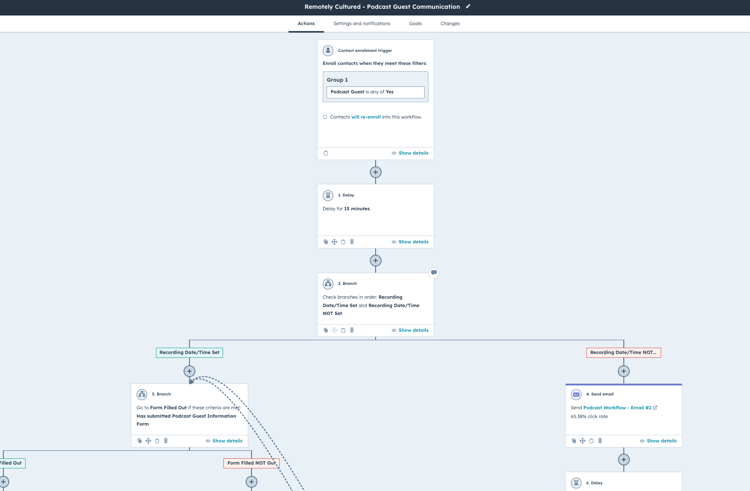
Add New CRM Properties
To ensure your automated workflow is running smoothly, you’ll need to add new contact properties or fields within your CRM so you can easily indicate if someone is a podcast guest, the date of their interview, the time of their interview, and the date their episode will go live.
Once someone says they will be a guest, update the property to indicate they’re a guest. If they aren’t in your CRM yet, add them and then update the property. Set up your automation so anyone that’s indicated as a podcast guest qualifies and will join the workflow.
Ask Your Guest To Schedule An Interview
Your first email should ask your guest to schedule an interview. We use a Calendly specifically for podcast interviews that is integrated with the host’s other calendars.
Integrate your interview scheduling tool with your CRM, so the date and time they select automatically updates the appropriate properties. If native integrations don’t exist, try Zapier. If Zapier doesn’t work, you’ll need to manually update the interview date and time properties in your CRM.
Every company is different, so do what you think is best — but in our workflow, if a guest doesn’t schedule an interview, they’ll get a reminder email. If they still don’t schedule an interview, they get removed from the workflow and we’ll receive an internal notification to reach out directly to the guest.
Ask Your Guest For More Information
After the guest has scheduled an interview, the workflow will detect that their interview date and time properties have been updated. So, they’ll stay in the workflow and receive an email asking them to share some information before the interview.
To have a meaningful interview, you will likely need to gather details about the guest’s company and topics they want to discuss beforehand. Create a simple landing page and form with all the information you need for the interview as well as anything you’ll need to promote the episode (i.e. headshot and bio).
In our workflow, if a guest doesn’t fill out the form, they’ll get a reminder email. If they still don’t schedule an interview, they get removed from the workflow and we’ll receive an internal notification to reach out directly to the guest.
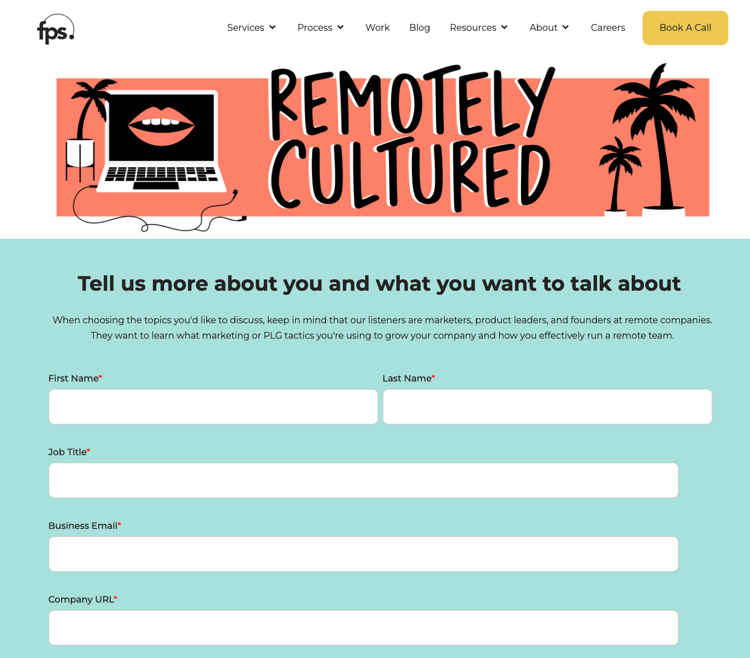
Help Your Guest Prep For The Interview
The workflow will detect that the guest has filled out the information form, so they’ll stay in the workflow and receive an email a few days before the interview with all the details they need to prepare. We share information about logging into our online recording studio as well as tips for good audio quality.
Prep For And Record The Interview
Prepare For The Interview
There are lots of ways you can go about researching guests and prepping for interviews, but all that really matters is the host is prepared and the guest knows what to expect.
At First Page, we created an interview prep template Google Doc that outlines the structure of the interview. We duplicate it for each guest, filling it out with the information they provided about themselves, their company, and the topics they want to discuss.
Our host uses the template as a jumping off point to do research about the guest and draft questions. She will also send the guest a list of questions ahead of the interview.
Record The Interview
There are tons of audio and video editing tools out there, and they’re fairly inexpensive. We chose Riverside because it’s both a recording studio and an editing platform all in one. It’s also very easy for anyone to use (even if you don’t have editing experience), provides transcripts, and automatically creates clips that we can use for social promotion.
No matter how you record the interview, make sure your guests understand how to join and your host is comfortable with the software. There’s nothing worse than having a great conversation, only to realize it wasn’t recorded.
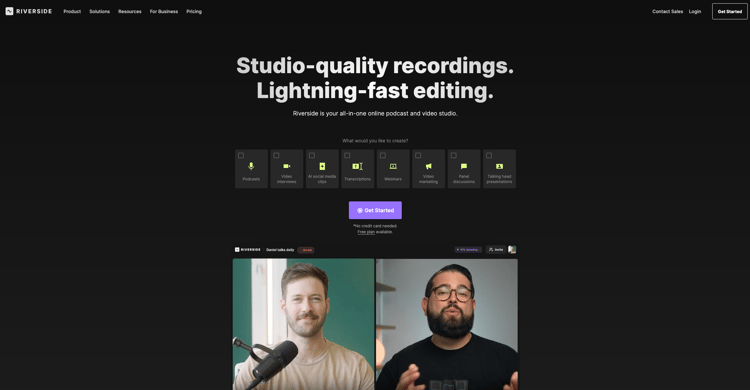
Edit And Publish Your Episodes
Edit The Episode
Some companies choose to record their interviews on a different platform than where they edit them. There are also lots of editing tools out there — and some are free, like GarageBand and Audacity.
You’ll need to record an intro, outro, and any ads (if you’re selling spots), and then add them to your interview. There is also likely some small talk at the beginning that you'll want to cut out.
Publish The Episode
There are also lots of podcast publishing tools to choose from. The features vary little between platforms, and they’re all fairly inexpensive. We looked at Castos and Libsyn, but ultimately chose Transistor because it seamlessly integrates with Riverside. Once we’re done editing an episode, we can send it over to Transistor directly from Riverside.
The podcast publishing tool is where you can edit the title and description of your episode as well as schedule it to go live on a future date. The tool will push your episode to all the major podcast platforms, like Spotify, Apple, and Google.
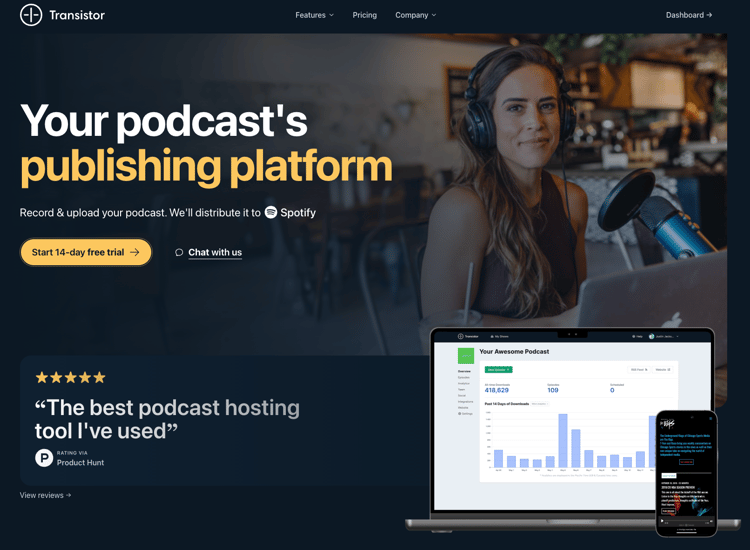
Promote Your Episodes
Producing an episode is only half the battle — now you need to promote it! This is especially important for new podcasts when you’re trying to get listeners and grow subscribers.
Promote On Social
As you’ve likely seen firsthand, video is dominating social media right now. So, create clips that highlight the best moments or nuggets of wisdom from each episode to share across channels. Even if your podcast is audio-only, leverage graphics and imagery to create engaging videos that accompany your soundbites.
As mentioned above, Riverside uses AI to automatically create video clips from our podcast recordings. We go in and edit the clips slightly to capture the correct soundbites, but the automation cuts down on the time it takes to create promotional assets.
Publish The Episode Webpage
In addition to the podcast platforms, most podcasts host their episodes on a website so people can listen without logging into Spotify or Apple Podcasts. Episode pages are also a great place to share transcripts for those that don’t want to listen or are hearing impaired. Depending on the topic, these pages can also help with SEO.
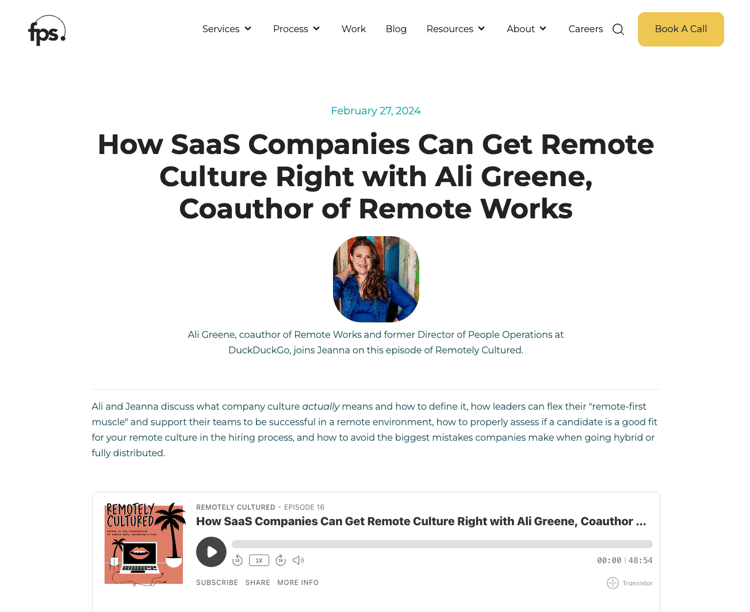
Create Additional Content
Each podcast episode is rich with information that can be broken up into separate blog posts or social posts. Turn one episode into multiple pieces of content that are valuable for your target audience. Because you’re publishing episodes on a regular cadence, your podcast can become consistent fuel for your content marketing engine.
Follow Up With Your Podcast Guests
Follow Up With Your Guest After The Interview
After the interview, thank the guest for their time and ask if they have any recommendations for future guests. They will more than likely have a few people in their circle who align with your target audience and would make great guests. Plus, a warm introduction always helps!
Follow Up With Your Guest When The Episode Goes Live
Once an episode is live, let the guest know and ask them to re-share your social posts with their network. This makes it super easy for them to share your podcast, while also promoting their work.
Follow Up With Your Guest After The Episode Has Been Live
Once the episode has been live for a week or so (the timing will depend on your company’s sales motion), reach back out to the guest and ask if they’re interested in your product.
During the podcast interview, the host should be asking questions about the challenges the guest is facing as it relates to your space and product. So, you can leverage that information to tailor your outreach to the guest’s specific pain points and explain how your product can solve them.
Need Help Creating a Podcast or Other Content?
If you’d rather partner with someone to produce your podcast, we’re here for you! Our experts can create podcasts, videos, blog posts, and interactive content that drive traffic, leads, and revenue. Learn more about our content marketing services.
